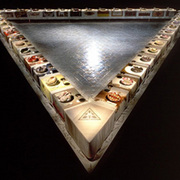Acclaimed author Jane F. Gerhard will present a lecture entitled “From Controversy to Canonization: A Cultural History of Judy Chicago’s The Dinner Party” on Wednesday, October 30 at 5 p.m. in Carleton College’s Boliou Hall, Room 104. Gerhard will discuss The Dinner Party's roots in early 1970s feminism, its reception among the art world establishment and general public, and its continuing ability to generate enthusiasm, life-changing perspectives, irritation and debate. This event is free and open to the public.
Judy Chicago's monumental art installation, The Dinner Party, was an immediate sensation when it debuted in 1979, and today it is considered the most popular work of art to emerge from the second-wave feminist movement. The piece is comprised of a giant ceremonial banquet with thirty-nine place settings, each commemorating important women from throughout history. Chicago inscribed the names of another 999 women in gold on the floor below the banquet table.
In her recent book, “The Dinner Party: Judy Chicago and the Power of Popular Feminism, 1970-2007” (University of Georgia Press, 2013), Gerhard examines the piece's popularity to understand how ideas about feminism migrated from activist and intellectual circles into the American mainstream in the last three decades of the twentieth century.
More than most social movements, feminism was transmitted and understood through culture—art installations, Ms. Magazine, television shows such as All in the Family, and thousands of other cultural artifacts. But the phenomenon of cultural feminism came under extraordinary criticism in the late 1970s and 1980s. Gerhard analyzes these divisions over whether cultural feminism was sufficiently activist in light of the shifting line separating liberalism from radicalism in post-1970s America. She concludes with a chapter on the 1990s, when The Dinner Party emerged as a target in political struggles over public funding for the arts, even as academic feminists denounced the piece for its alleged essentialism.
The path that The Dinner Party traveled—from inception (1973) to completion (1979) to tour (1979-1989) to the permanent collection of the Brooklyn Museum (2007)—sheds light on the history of American feminism since 1970 and on the ways popular feminism in particular can illuminate important trends and transformations in the broader culture.
This event is sponsored by the Carleton College Art Department of Art and Art History. For more information, including disability accommodations, call (507) 222-4341.



